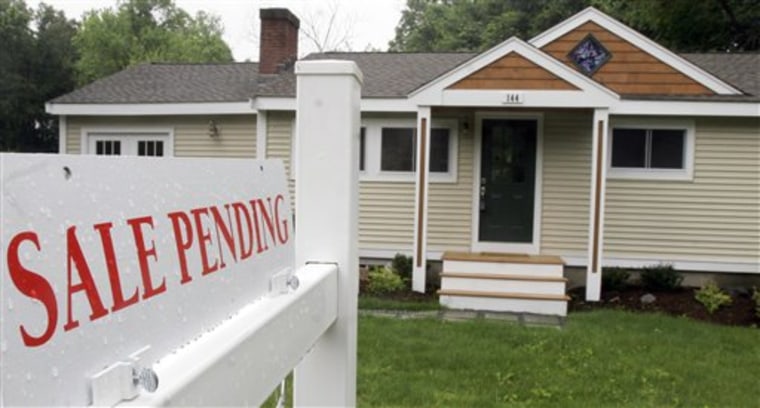A rush of homebuyers aiming to meet a deadline to qualify for a federal tax credit pushed the number of signed sales contracts to the highest level since October.
The National Association of Realtors said Wednesday its seasonally adjusted index of sales agreements for previously occupied homes rose 6 percent in April from a month earlier to a reading of 110.9. March's reading was revised upward to 104.6.
The rise marked the third consecutive month of increases, all of them aided by federal tax credits of up to $8,000.
But the tax credits expired on April 30. Many analysts expect sales to drop in the coming months.
Even though mortgage rates are near record lows and home prices have declined dramatically, potential buyers are unlikely to act if they don't have jobs or fear that their jobs are in jeopardy.
"Clearly, the race to meet the tax credit deadline has left the home-buying pipeline rather empty, and we fear that still high unemployment, heavy indebtedness and tight credit will mean that it stays that way," wrote Paul Dales, U.S. economist with Capital Economics.
Evidence of a slowing market was apparent Wednesday when the Mortgage Bankers Association released a weekly report on applications to purchase homes. Applications fell for the fourth-straight week to the lowest level since April 1997. Plus, foreclosures are still at extraordinary levels, which is likely to push down home prices in the second half of the year.
Investors, however, seemed pleased with the April rise in pending home sales. The Dow Jones industrial average rose more than 60 points in early trading.
Some analysts are less fearful than others. Ian Shepherdson, chief U.S. economist at High Frequency Economics, wrote that he expects "a gentle recovery once the plunge following the end of the tax credit is over."
The Realtors index provides an early measurement of sales activity because there is usually a one- to two- month lag between a sales contract and a completed deal. A reading of 100 is equal to the average level of sales activity in 2001, when the index started.
Congress included a temporary tax credit to boost home sales in the $787 billion stimulus package signed into law a month after President Barack Obama took office. The idea was to bring the housing market back to life. Lawmakers, after intense lobbying from the real estate industry, agreed last fall to extend it and expand it to more buyers.
First-time buyers were eligible for a tax credit of up to $8,000. Current owners who bought and moved into another home could qualify for a credit of up to $6,500. To qualify, buyers had to have a signed sales contract by April 30 and must close the sale by the end of this month.
About 2.6 million households had used the credit as of late April at a cost of $18.7 billion, according to the Internal Revenue Service.
The biggest boost for pending sales was in the Northeast, where sales rose nearly 30 percent. Sales were up 7.5 percent in the West and about 4 percent in the Midwest. They fell 0.6 percent in the South.
